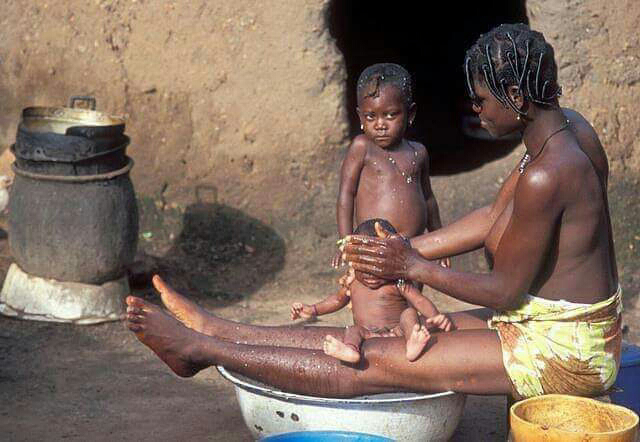My Generation: My Pride.
By Ogiri John Ogiri
I count it as a privilege to have been born in, and to have belonged to a generation and time when life was in its simplest,non-competitive state. I was born on one of my maternal grandmother's farms located just immediately after "Akpali Ol'Olobo" along 'Oladegbo-Alaglanu' footpath in a village called "Oladegbo Edumoga" in Okpokwu Local Government area of Benue State in the early eighties. It shares boundaries with Alaglanu-Obotu to the east,Obotu-Adum, Ipoya and Olaidu to the west,and Ogomotu, Opialu,Akpuneje,to the South. Oladegbo was known for her riches in bush mangoes (Upi), palm trees(och'ali), kolanut trees(Och'énmé), bamboo trees (Och'acho),local snails ( igbi mla aklihé) local grinding stones (Égo) hewn from a huge igneous rock deposit called "Okplégo". The village soils was equally known for its high yields of such crops as rice (ochikapa),cassava(oyila),yams (ihi,Obuna,Ikpalo,ulayi, agbaha etc).
At the time of my birth,there was only one primary school (LGEA Primary School) and a Roman Catholic Mission (St Pius Catholic Church). However,there was no motorable road,no hospital or dispensary in that village. Consequently, there was no way a hospital service could easily be accessed. Only one 'substantive' doctor and midwife was present: my maternal grandmother, Mrs Janet Anyame Abba. She was the 'gynaecologist,Obstetrician and paediatrician' who ensured that I was safely delivered and kept alive. Sands was used to clean me up. According to her, immediately I was eased out of my mum's birth canal,she saw that I was a boy. Then she shouted in a wild jubilation saying "Api kwo, api kwo" meaning, "he has a penis,he has a penis". She had no living male child so I became her first son and grandson alive. Local herbs did the magic in the absence of Orthodox drugs in keeping infantile sicknesses away from me. It was a privilege having my mum bathe me using such a less expensive method as placing me on her loving and caring laps and legs usually stretched across a basin or any local bowl that could hold water.No specialized bathing bowls;no pampas to prevent any emergency escape of urine and excreta. Mama bored everything. Palm kernel oil or " eneefi"was usually applied to keep my skin from drying. In those days, a woman from the 'labour room' could only kept her body warm by lying on a wooden bed under which laid a huge bowl holding a charcoal fire which embers glowed with every intermittent fanning. This is when contentment with little still prevailed over inordinate ambitions to acquire more.
You could sleep in a hut and still wake up with a peaceful mind,not worrying over any fear of kidnappers,bandits and armed herdsmen attacking you. I was born in this society.
In this society, a child given birth to by any family belonged to all. Any member of a community could punish an erring child without incurring the anger of a parent. Then, Teachers were gods. A child could equally eat in any compound freely without being tagged a beggar. They were no barb-wired fences and iron-gated entrances to prevent anyone from entering any home. They were no dining rooms where only family members could eat. On the contrary,meals were eaten openly outside in the family compound. Passers-by from farms,village streams or rivers, hunting expeditions and markets could be invited to partake in the eating and they could gladly drop their luggage and games and join. There was enough food for everyone.
In this society, visitors were treated more sumptuously than family members. The best bush meat,the neatest plates,the most expensive spoons were all reserved for visitors. These things came out only when visitors came. As young children, we usually prayed and looked forward to the days visitors came around.
In this society, whistling in the dark or during meal times was forbidden. Men were forbidden from bathing in the same area of the river or stream used by the women and vice-versa. In my Idoma language, this place is called "Ogbléga".
In this predominantly traditional religious society, stealing or lying was an abomination. In the event of stealing, the items stolen could be tied or hung around the culprit's neck as he was taken round the village for everyone to see. Stealing usually attracted public ridicule and stigmatization.
In this society, we could freely leave our items in our various family huts and go anywhere,(whether it was to the "Ekeh,Otukpo,Ogobia,Utonkon,Ukwonyo,Ogbago or Nkwo" markets; whether we went to the farms,rivers or streams for fishing, or to the bush to collect bush mangoes popularly called "upi" in Idoma) and still return to find them intact. Majority of the huts had no doors and those who had doors had no padlocks. They were no curtains. Family beds were hewn out of woods and palm trees ("Akw'ali). Many had no mattress yet peace and tranquility reigned to high heaven.
In this society, great interest was shown by the youths in the actual participation in cultural dances such as "Oglinya,Inyalo, Aglima,Aja,Enumajéjé, Omak'oyi" among many others. Moon-lit night times were usually periods of rehearsals on cultural dances for the youths and the elderly. During day times, the youths organized communal group farming called "Oopia" on a rotational basis. Through this farming arrangement, every youth in an age-group could boast of a sizeable farm of his own. They were so positively-engaged that they had no time to engage in nefarious activities like cultism.
In this society,not greeting, or helping an elderly person to pound yam or carrying his or her luggage when one passed their compounds or passed them on the road was considered a grave act of disrespect.
My generation was a generation that demanded and enforced respect for parents and family values. We had no mobile phones or personal computers; we knew nothing about the internet, yet we were very disciplined.
This is my generation. I am proud of it.
www.ogirijohn.blogspot.com


Comments